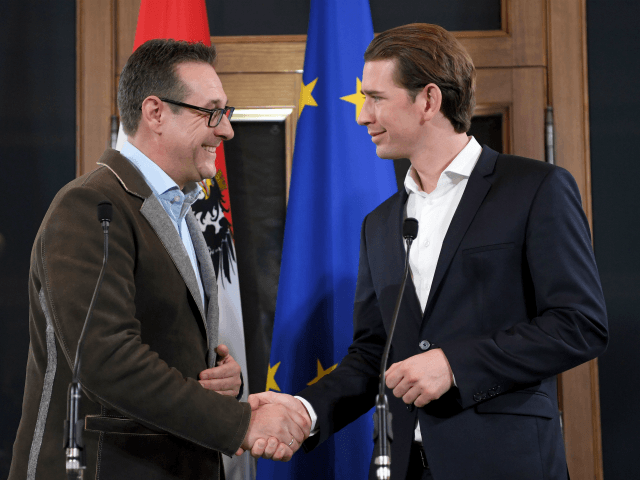Austria’s anti-mass migration Freedom Party (FPÖ) has finalised their coalition agreement with the Austrian People’s Party (ÖVP), securing several major ministries including the Interior Ministry, Defence Ministry, and Foreign Ministry.
The coalition agreement, which began negotiations shortly after the national election in October, was finalised on Friday evening and announced by conservative ÖVP leader Sebastian Kurz, who has become the country’s new Chancellor.
The agreement is the first time the populist FPÖ has been in government since 2005. Party leader Heinz-Christian Strache has been able to claim many major ministries, which will allow them to advance their programme of anti-Islamisation and combat mass illegal migration.
They have also convinced the ÖVP to overturn an indoor smoking ban.
One of the key ministries secured by Mr Strache, now the Vice-chancellor, is the Ministry of the Interior, which will be headed by Herbert Kickl — an outspoken critic of Islamisation.
Austria: 40 Per Cent of Islamic Radicals Recently Arrived as ‘Refugees’ https://t.co/kJikaHbNls pic.twitter.com/kNY4g1oi9p
— Breitbart London (@BreitbartLondon) November 15, 2016
Mr Kickl, who is known for his fiery rhetoric and speeches, has been labelled “Strache’s mastermind” by some, because of his leadership as campaign manager in the national election and in the Austrian presidential elections last year, which saw FPÖ politician Norbert Hofer come second to far-left current president Alexander Van der Bellen.
Hofer, who is often seen as the second most prominent member of the FPÖ, will take the leadership of the Ministry of Infrastructure, though early reports claimed he was being eyed for Foreign Minister.
The FPÖ has chosen an ex-diplomat for the position of Foreign Minister in the form of Middle East expert Karin Kneissl, who Strache has compared to Bruno Kriesky, one of Austria’s most successful politicians.
He observed that Kneissl, nominated by the FPÖ despite not being a member of the party, was “appreciated at home and abroad.”
The FPÖ has also claimed the Defence Ministry, which will be headed by the head of the Styrian branch of the party Mario Kunasek. It is rare for one party to control both the Interior Ministry and the Defence Ministry, which encompasses both the military and domestic security services and police.
Both Strache and Sebastian Kurz have made it clear that they will pursue a much tougher migration policy than the previous coalition and will be tougher on Islamisation.
EU Deeply Divided On Migration As Austria’s New Chancellor Rejects Migrant Quotas https://t.co/GdXBGGDETy
— Breitbart London (@BreitbartLondon) December 16, 2017
Earlier this week Kurz rejected the European Union’s mandatory migrant redistribution quotas, and in the past Strache has called for focus to be shifted toward deportations and a reduction of illegal migration to zero.
Kurz, while Foreign Minister, was also the architect behind the ban on the Islamic full-face veil. Strache has also rejected Islamisation, saying at a rally earlier this year that he wanted to ban Islamic extremism from Austria entirely.
Austrian Populist Leader Vows to Ban Islamism https://t.co/5HsDPfWcRn pic.twitter.com/4E379p8GtS
— Breitbart London (@BreitbartLondon) January 17, 2017
The last time the FPÖ entered government, under the leadership of controversial politician Jörg Haider, the European Union threatened the same sanctions as they are currently doing to Poland.
It remains to be seen if the political bloc will react as strongly to the new coalition, though many suspect it lacks the strength to impose its will on Austria at present.

COMMENTS
Please let us know if you're having issues with commenting.